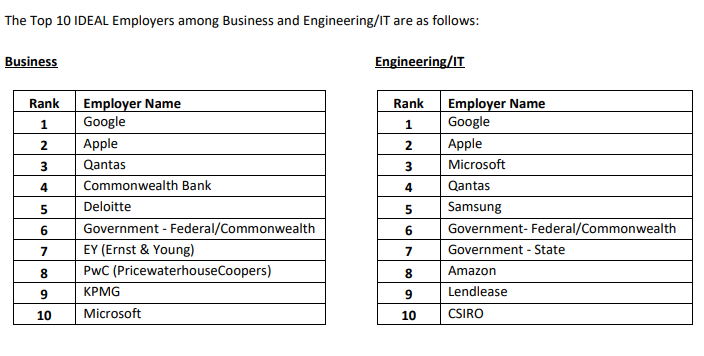Australian future workforce sees Google and Apple as their ideal employers

Universum has launched the findings from the Australia portion of the annual talent survey, with participating from over 5,600 students from the leading universities in Australia. Set out to track career aspirations and preferences of Australia’s future talent pool, the survey also ranks the most coveted employers based solely on the responses collected. This year, Google was ranked the number one most ideal employer among both business and STEM students.
Mike Parsons, managing director of Universum APAC, said “We can see that talent in Australia really look towards an employer’s culture and the softer aspects of the employment experience they offer when selecting where they want to work. Talent in this market is also quite motivated by career activism, that is to say, they are more attracted to employers who share their values and beliefs, or who speak out on issues that matter to them.”
Where do Australian students want to work?
When asked about where they would like to start their career, 55% of business students and 47% of STEM students cited a preference for working for an international company. From the findings, it also showed these two groups of talents have a preference to work in mid-size companies that have 51-250 employees. Those studying health and medicine or majors in humanities, arts or education, have a much stronger preference for the public sector. For all cohorts, working for a national private employer was their second choice.
Among business graduates, the preferred industries are banking (43%), management & strategy consulting (32%) and financial services & technology (31%). In comparison, STEM students are most attracted to computer software & technology (32%), IT & engineering consulting (32%) and aerospace & defence (29%).
Talent feels work ethic is one of their strongest skills
In Australia, the survey revealed business students believe their strongest skills are their work ethic, communication and problem-solving. While STEM graduates consider problem solving, positive attitude and work ethic as their greatest strengths. When asked about the skills they want to improve most, time management was the number one skill that was selected by students across all fields of study.
Work ethic is usually ranked quite low in other markets around the region, which really underlines a difference in attitude in Australia where young talent feel they are very hardworking and committed to the employers and careers they choose.
Best practices for communicating and interacting with young talent
The survey explored how young talent learn about careers and engage with prospective employers. The data showed that 81% of students visited employer booths at the universities, 76% participated in structured networking sessions, 71% took part in career counseling, and 71% attended presentations hosted by employers. This strong level of participation in physical activities show that students in Australia still really value human interaction and employers should continue to find ways to interact with their target talent, despite the challenges posed by the recent pandemic.
This year, the survey dug deeper into the specific online channels students have used to research about their potential future employers. 63% of talent indicated they would visit the employer’s career page, followed by their corporate website (54%) and the company’s LinkedIn page (38%). When it comes to topics that capture their attention, talent wants to see content that focuses on the training and development employers offer, what advancement opportunities there are, and what the employer is doing with diversity and inclusiveness. If employers want to be successful in influencing and attracting talent, they not only need to show the right things, they need to deliver their messaging in an authentic and believable way, leading with real employees and real stories.
“If an employer wants to run at the front of the pack in Australia they need to be communicating artfully with their future workforce across a mix of online and offline channels. To execute this courting ritual well, and to get talent to engage, employers need to create impactful messaging through careful analysis of the available talent preference data. This is also imperative in order to have the consistency of what is communicated across channels and over time,” Parsons said.

















